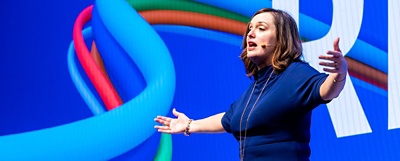What if you find yourself in a situation where you feel different than others present—whether it's your race or gender or some other defining characteristic. Do you have any tips for what a person can do in that moment?
Say you have to do a presentation on a stage. You may feel like going in on your back foot. You may want to back away from your audience because that makes you feel safe. Your brain starts to think you're prey and that the audience members are predators.
Instead, you want to go on the front foot towards your audience. That will send signals to your brain that you’re confident.
如果你在一个网络事件。当you enter, go in on your front foot. Walk in like a lion! Hold your head stiller than normal; the head wants to bob up and down in agreement when you're nervous. It doesn't have to be as still as Clint Eastwood in “Dirty Harry”—just stiller than normal—and make your gestures have beginnings and ends. What you'll find is if you practice this for awhile, you start to feel calmer. You'll send these great chemicals rushing around your body that will make you relax.
Then think, "I'm going to find somebody here who looks nervous and make them feel more relaxed.” Say to that person, "Hey, shall we find others to talk to? Let's buddy up with each other." Then go help other people feel good about themselves.
If you’re doing all this, you’ll become conscious of your audience. When you become conscious of your audience, you can’t be self-conscious. Same thing with a job interview—instead of being worried about yourself, think about making the job interviewer comfortable.
Let’s shift topics a bit. You’ve been talking to audiences about diversity and inclusion for some years now. Have you seen any changes over that time?
There's much more understanding as to the value of diversity and inclusion now. Also there are spaces outside the corporate world where it’s talked about: the “The Guilty Feminist,” other podcasts, and communities that are growing such as the #MeToo movement and Black Lives Matter. There are a lot of different movements that are saying, "Hey, we have power, we take space, we start the conversation. We have our own dialogue around this, and we have some influence."
You're in the entertainment industry, where there’s been a lot of activity around #MeToo. Do you feel that awareness is growing in the corporate world?
I think both men and women have become more aware of what consent means and what it means to sit together in a space and say, “Are you relaxed? Is there anything I'm saying or doing that might feel intrusive or intimidating to you?” There’s the increasing realization that if it’s a work environment—or any environment—you don’t want to put someone in an uncomfortable position.
I think the conversation has been a healthy one. It's a difficult time, but I think we're going to move past this into a calmer time with a great deal more understanding. And I think this generation coming up has a great deal more understanding.
You have a popular podcast, Guilty Feminist. What was the impetus for this podcast?
It was the end of 2015, and I just felt like there was this rise of feminism. Hillary Clinton was running for U.S. president. Bill Cosby's accusers came out and spoke. The groundbreaking live showFleabaghad come out.
我承认,我开始effo的播客rt to discuss my own marginalization, and what I've learned about more than anything is my own privilege. We’ve had so many women of color on; so many queer women and disabled women. I’ve really learned a lot about how it is harder to be not straight and white. I wanted to be in the discussion, in the conversation, but I have to admit that the guests that I've been lucky enough to book have educated me brilliantly and also provided hours of entertainment and joy.
The feminist movement had its greatest moment in the 1960s. How would you characterize the state of feminism today?
Gloria Steinem said a few years back that a movement has to be moving to somewhere. I feel like we're moving somewhere again.
With today’s feminists, I feel like there's enough of us in all walks of life. You don't have to be special or speak in intense, dense academic tones all the time in order to participate in this space. You have to want equality, and you have to want to take up more space for yourself, for other women, and especially women more marginalized than you. We're going to get together in all our imperfections and hypocrisies and insecurities, and we're going to start doing it—let’s get moving! I think that's what I would say about feminism—it’s moving again.
Inclusion and diversity have emerged as leading goals for most businesses. What's the most important thing businesses can do to achieve success in this realm?
If you want to attract and retain diverse people, you need to let them be architects of the space. Allow them to create the “microclimate” for success. Don't stick them in the corner and go, "Look, you're included!," and expect them to operate in a space that was not designed for them and where they may not feel truly comfortable. Have the discussion, and let them be the architects of the space.
For more coverage of past Workday Rising speakers, seehere.






